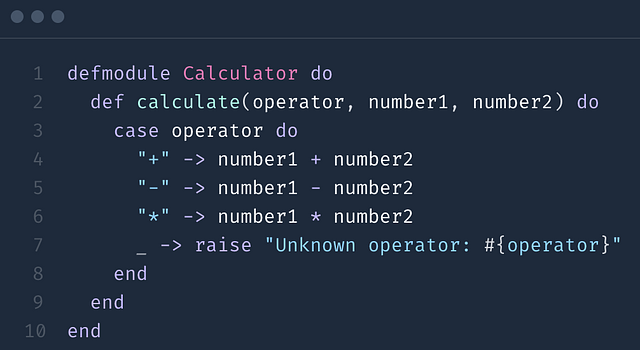Free course for beginners
Elixir Course
The Elixir language is quite complex. Most of its elements are more complex than they first appear. In the first module, we will look at modules and functions, basic data types and operations with them.
Where is the Elixir programming language used?
Elixir is a functional and scalable programming language, ideal for high-load web applications, fintech, IoT, and cloud services. Thanks to its high fault tolerance and concurrency, it is used in messengers, financial systems, and distributed services. Elixir represents the future of high-performance IT solutions

What will you learn in the "Elixir" course?
You’ll learn the basic syntax of Elixir — a fundamental skill that will enable you to write reliable and scalable applications. After the course, you’ll be able to work with functional constructs, processes, data streams, and macros, as well as use the actor model for concurrent programming
Join 74,761 students who have successfully completed courses
Start LearningLearning program
How the training is organised
Convenient format
Practice in the browser
AI assistance without limits
Try a demo lesson without signing up. Practice included
Sorting out the questions
What is studied in the "Elixir Basics" course and why is it necessary?
n this course, you will learn the fundamentals of the functional programming language Elixir, which runs on the Erlang virtual machine and is used for developing distributed, fault-tolerant, and scalable systems. You will learn how to use immutable data structures, write functions, work with pattern matching, recursion, and modules. The course will provide an understanding of how to write readable and reliable code in a functional style. It is suitable for both beginner developers and those who want to explore a modern language for backend development.
How does the "Elixir Basics" course help in a programmer's career?
Elixir is in demand in companies that prioritize high reliability, scalability, and fault tolerance in their services. It is used in developing APIs, messengers, financial systems, and multiplayer platforms. By mastering Elixir, you will be eligible for backend developer positions, especially in teams using Phoenix or other modern technologies based on Elixir.
Why choose the Elixir programming language?
Elixir combines the power of the Erlang platform with a modern syntax and convenient development tools. It is designed for building resilient and scalable systems and excels in real-time tasks. Thanks to its concise syntax and functional approach, Elixir code is easier to maintain and test. It is an excellent choice for those who want to explore modern technologies and write high-performance code.
What to do after completing the "Elixir Basics" course?
After completing the course, you will have a solid understanding of functional programming basics, be able to write simple modules, functions, and use basic language constructs. The next step would be mastering the Phoenix framework, working with databases, implementing REST APIs, and building web applications. You can also dive deeper into distributed computing, OTP (Open Telecom Platform), and asynchronous architectures.
Is a certificate provided at the end of the course?
A certificate is not issued upon completion of the course, but you will gain practical knowledge that you can apply in real projects. You will learn to write reliable and readable code in Elixir, master key aspects of the functional approach, and be able to continue your learning at a more advanced level.
How quickly can you master Elixir from scratch?
Elixir is a language that you can start learning even without extensive programming experience. The basics of syntax, pattern matching, working with functions, and recursion can be learned in 2–4 weeks with regular practice. To gain a deep understanding of OTP architecture, concurrency, and scalability, more time and hands-on project experience will be required.
What basic knowledge is needed before studying Elixir?
Before starting the course, it is helpful to have a general understanding of programming logic and at least some experience with any programming language. However, the course is suitable for complete beginners as well. All topics are explained clearly with a focus on practical exercises. Thanks to Elixir’s functional style, you will be able to think structurally and cleanly right from the start.
Can Elixir be used for mobile application development?
Elixir is not directly used for creating native mobile applications, but it is excellent for developing their server-side components, especially in tasks where stability and high performance are important. You can use Elixir to create APIs and process data that interact with mobile clients on iOS or Android.
Sign up and start learning. For free. Forever